Marvel Netflix Series: The Villains
Filled with spoilers
below
Over the past few months I’ve watched Luke Cage, Jessica Jones and Daredevil
in that order, so I’ve watched them all out of order. While this means I
wasn’t really able to appreciate the interlocked nature of the series and
really spot cross-series links when they showed up (a lot of the time) it did
allow me to take each of the series from a stand-alone point (as much as that
is possible when Marvel movies and television series have been around since
forever and I’ve been reading comics pretty much my whole life).
The series are all more distinct than they are similar but
one of the uniting threads is the quality of the villains they face. In Luke Cage this means Cottonmouth (played
by Mahershala Ali, who seems ever present and excellent these days) and Mariah
to a lesser extent although the character of Diamondback doesn’t match up to
those two and seems like a late and not as well thought out entry (for every
season of these shows, I’ve thought at one point or another that 13 episodes
might be too much since the narrative strains somewhere between halfway and
episode 10). Mariah, especially, is interesting in her descent from corrupt
politician who wants the best for her neighbourhood most of all to a more dark
and sinister character. Unfortunately her rise coincides with the killing off of Cottonmouth (by her) which deprives us of one of the smoother but still ruthless villains. Cottonmouth is noteworthy especially for his willingness to be a villain. Unlike Mariah or Fisk in Daredevil he isn't interested in the city and making it better. He wants things better for himself.
In Jessica Jones, Kilgrave remains one of
the most entertaining super powered villains in recent memory because of the
depth in which they try to psychoanalyze him. Sure, mind control is pretty
scary but Kilgrave is a supremely evil character whose warped sense of the
world may be due to the fact that he has no idea how to exist in a world where
he’s never had to hear no. It doesn’t make him any less evil (choosing to do
unethical things is a choice, despite the reasoning) but it does make him much
more relatable. After all, ethics are pretty subjective and he’s never had
parents who told him (or could tell him) what was right or wrong.
Wilson Fisk is undoubtedly the best character of Daredevil’s first season. The second
season of the series is quite good as well but without a strong central
villain, it lacks the focus of the narrative. The return of Stick and Yoshioka
plus the introduction of antiheroes like The Punisher and Elektra are welcome
additions (especially The Punisher) but the episodes in season two featuring
Fisk (rapidly on his way to owning the Kingpin moniker) are the best in the season.
His manipulation of Frank Castle which sends him on the way to the incarnation
of the Punisher is magnificent.
Fisk rules the screen in season one because of the
originality of his character. We’ve seen Kingpin for years in Daredevil comics as well as in Spiderman so getting originality into
this character is a decent achievement. Having the character with a redone
backstory involving killing his father (also, is the entire cast of The Wire hired by Marvel for this
series?) immediately adds credibility to Fisk’s way of seeming like a man who
is childish in his actions. While violent and manipulative in a very adult way,
Fisk’s mannerisms and voice seem like he’s always on the verge of either crying
or screaming. Fisk’s love for Vanessa and his desire to do everything to please
her also has a childlike romanticism to it.
Without strong antagonists, series are not set up to
succeed. In the past it was enough to have villains who were caricatures which
would be made up for by the heroes commanding the screen. But as heroes have
become more troubled and complex, the need for complex villains has arisen as well
(it was well overdue). Hopefully the trend of quality villains continues into
future seasons and series as well.


Comments
Post a Comment